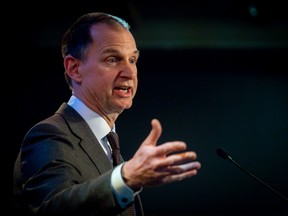With the Quebec government saddled with an $11-billion deficit, curbing the monster is rapidly becoming the subject of debate.

Bristling at just the mention of the word austerity, which haunted the old Liberal government for years, two senior Coalition Avenir Québec government ministers insisted there are no radical cuts in the works even though groups have been coming forward saying they are feeling the pinch now.
However, where things are fuzzy is what’s in store for the future. Quebec has given itself five years to get back to balanced books, which means next year will be the beginning of what they say will be a reduction in the normal growth in spending.
That means the overall average spending increase in the 2025-26 budget and in the years to come will be about three per cent a year on average for the whole government. Broken down — with the exception of health and education — some ministries will be getting a much smaller piece of the pie.
None of that has been detailed yet.
Some ministries could be in for sticker shock compared with the first six years of CAQ government, when it was in a hurry to deliver on its huge list of election promises and was awash in cash, some left over from the Liberal years.
Last year alone, for example, spending in education went up by 9.3 per cent. Health and social services got a 4.2 per cent boost. Most of that money went toward the hefty public-sector salary increases negotiated by Quebec.
But that was then. Today, the chickens have come home to roost.
“It won’t be a drastic thing; it will be done gradually,” LeBel told reporters when asked about the government’s new-found interest in the terms financial rigour and efficiency. “This revision process is being done in co-operation with the ministries.
“It’s not true there is austerity. It’s not true there are cuts.”
The message was similar from Girard, who said the only government that really played the austerity game were the Liberals, who capped spending at one per cent in their first two years in office, a number that did not cover normal growth in costs.
Girard said that for the first five years in office, the CAQ increased overall spending on average by seven per cent a year.
“The three per cent growth in spending (planned for the future) will allow us to get back to balanced books, progressively, in an intelligent, gradual way,” Girard said, arriving for a cabinet meeting at the legislature.
“There are some who want us to cut spending, others want us to spend more,” Girard said. “We have to find the reasonable solution that respects the capacity of Quebecers to pay.”
Some groups are complaining they are feeling the squeeze already, even before Quebec makes public a plan to attain a zero deficit.
For QS, it’s a sign the austerity age has roared back to life.
During question period in the legislature Wednesday, QS co-spokesperson Gabriel Nadeau-Dubois told Premier François Legault he is caught in the horns of a dilemma: He has created an $11-billion deficit with no tangible improvement in services at the same time as his caucus pressures him to cut.
“I have a simple question, the same many Quebecers are asking,” Nadeau-Dubois shot across the floor at Legault. “Where is the next cut?”
Legault said there is a difference between respecting the current budget spending limits — what’s affecting groups today — and the exercise ahead. Limiting Quebec’s spending to three per cent a year in the future represents $2 billion off the deficit every year, he noted.
“What QS is telling us today is that money grows on trees,” Legault said. “That we need to grow the deficit and increase taxes at the same time. This is not our approach. This is why his party will remain in the opposition for an eternity.”
X.com/philipauthier